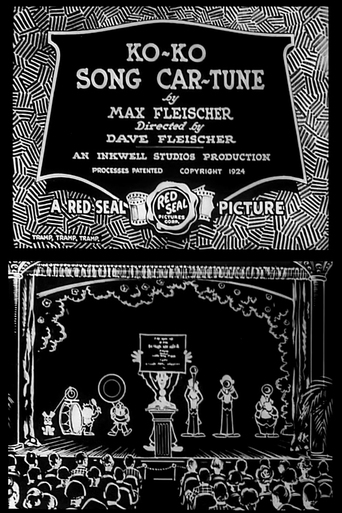TheLittleSongbird
Dave Fleischer was responsible for many gems. Ones that were amusing and charming, though over-cuteness did come through in some efforts and the stories were always pretty thin, with appealing characters, outstanding music and visuals that were inventive and with innovative animation techniques.Ko-Ko similarly was an always amiable character to watch and among the better recurring characters in Fleischer's early work. Likewise, his series of Out of the Inkwell cartoons were among the best early efforts of Fleischer and silent cartoons in general. Fleischer may not be at his very finest and there are far better Ko-Ko cartoons than 'Tramp, Tramp, Tramp the Boys are Marching'. It is still pretty good though as long as not too much is demanded.The story is as thin as ice, not really one at all. Sometimes it's a bit pat and with little surprises. Ko-Ko could have had more to do.However, there is a good deal to like. The animated sing-along portion is fun and charming and the character interplay likewise. One expects the animation to be primitive and very low quality, judging by that it's the 20s when animation techniques were not as many, as refined, as ambitious and in their infancy. While Fleischer became more refined and inventive later certainly, the animation is surprisingly good with some nice visual wackiness and wit.Everything is bright and breezy and there are amusing moments, though never particularly imaginative. The characters are likeable. In summation, pretty good. 7/10 Bethany Cox
morrison-dylan-fan
Looking around for titles to view for a poll being held on IMDb's Classic Film board for the best movies of 1926,I noticed a fellow IMDb'er mention a fun sounding animation film in a posting,which led to me getting ready to pay 'the boys' a visit.The plot:Noticing a black board,a clown stops by the board and draws a marching band which comes alive.Marching out of the black board room,the band head to a cinema where they perform a special song for the surprised audience.View on the film:Whilst the online version that I viewed sadly did not contain the films soundtrack,director Dave Fleischer was impressively able to make the lack of a soundtrack something that was pretty easy to overlook, thanks to Fleischer giving each of the band members a warm,rough sketch appearance which shines as the band hits their first note.
tavm
Just watched this silent Max Fleischer cartoon on the Internet Archive. In this one Ko-Ko the Clown is drawn in white chalk outline on a black board. He then takes that chalk and draws a band that marches through the city to a theater where he then takes out a board which has written on it an invitation to sing the title song of this short while following the Bouncing Ball. Near the end of the song, a cartoon of a prisoner then appears and replaces the Ball as it walks on the remaining lyrics. There was no sound so part of me was a little bored. Still, this was another fascinating find to me as an old-time animation buff. Oh, and there was a dog in the band. He looked like he could've been Ko-Ko's eventual pet, Fitz.
Robert Reynolds
This short actually has a story in the animated portion which more or less leads into the song itself. Because I want to discuss the short, there will be spoilers below: The short opens with an animated sequence featuring a dog-like creature in uniform stopping by to see a girl. There are some nice musically-oriented bits (a piece of gate used like a harp, for one) and the soldier winds up in the girl's room.Meanwhile, the commander uses his horse to call his unit, the soldier doesn't go and is arrested and put to labor, breaking stones with a hammer, deriving some musical bits there, notes placed in time with blows on the rock from the hammer. He also reduces a rock in size and makes it into the "bouncing ball" to cue the lyrics of the title song, which can be related to the basic story.There's some incidental animation of marching soldiers during the sing-along and the short is quite effective overall. Recommended.
